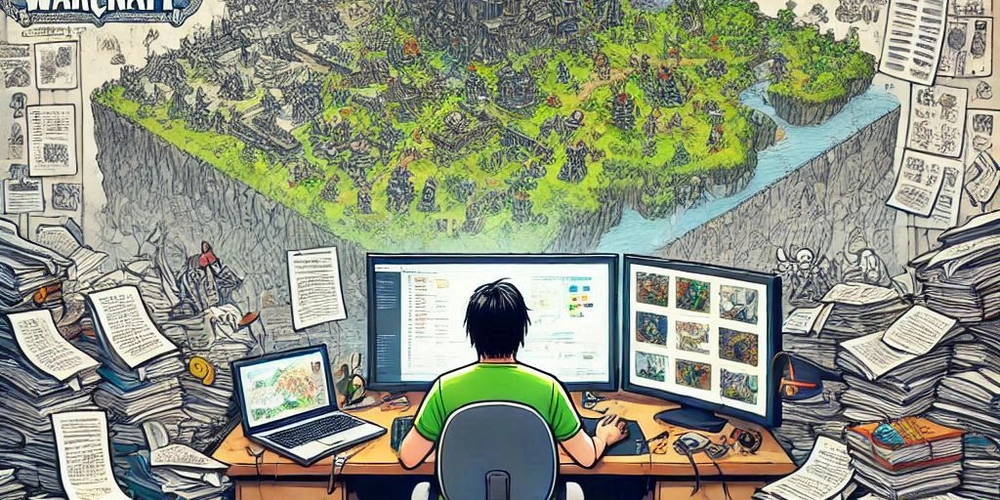Why Your First Game Shouldn't Be an MMORPG
Creating your first game is exciting. Your first game is an opportunity to learn and grow as a developer. You've got ideas brewing and dreams of players enjoying your creation. For many, MMORPGs (Massively Multiplayer Online Role-Playing Games) look like the ultimate choice. They're popular, have loyal fanbases, and promise endless possibilities. However, starting with an MMORPG can lead to frustration, burnout, and disappointment. So, here's why you should avoid it as your first project. 1. MMORPGs are Too Complex Developing an MMORPG involves multiple systems working together seamlessly. You need: A vast open world: Designing maps, quests, and lore takes significant time and effort. Networking and servers: You'll need to manage player connections and synchronize data in real-time. Character systems: Players expect customization, progression, and unique abilities. Economy and balance: Virtual economies require careful planning to avoid inflation or exploitation. Each of these systems is a full project on its own. Combining them creates overwhelming complexity. Even experienced developers with teams struggle with MMORPGs. Starting with this genre is like trying to climb Everest without training. 2. Time and Cost Are Unmanageable Building an MMORPG takes years. Games like World of Warcraft and Final Fantasy XIV were created by large teams over several years. Blizzard worked on World of Warcraft for five years before its release. Even smaller MMORPGs like Tibia or RuneScape took years to develop and refine. As a solo or beginner developer, you likely don't have the time or resources. Hosting servers, maintaining updates, and managing player feedback require money and manpower. If you're not ready to invest thousands of dollars and countless hours, this genre isn't for you. 3. It's Easy to Burn Out Game development is a marathon, not a sprint. MMORPGs require constant effort, from debugging to content updates. For your first project, the sheer workload can cause you to lose motivation. Imagine spending months working on the networking for your game, only to realize you haven't touched gameplay or visuals. It's discouraging. Instead of finishing your first project, you're left with a pile of unfinished code. 4. Players Expect Perfection Gamers have high standards for MMORPGs. They expect polished graphics, stable servers, and engaging content. Meeting these expectations as a beginner is nearly impossible. A poorly made MMORPG will attract criticism, which can hurt your confidence. For example, the game Bless Online launched in 2018 with bugs, performance issues, and lackluster content. Despite its developers being experienced, the game failed to meet player expectations and shut down within two years. If a professional team struggled, imagine the challenges you'll face. 5. Start Small, Learn Big Instead of jumping into an MMORPG, focus on smaller projects. Games like platformers, puzzle games, or simple RPGs are great for learning. These projects teach you about: Programming basics Game mechanics Player feedback Time management When I started, my first project was a simple 2D shooter. It wasn't groundbreaking, but it taught me how to handle player input, create levels, and debug efficiently. That experience was invaluable when I moved on to larger projects. 6. You Can Scale Up Later Starting small doesn't mean giving up on your MMORPG dream. It's about building the skills and knowledge you'll need. Games like Stardew Valley and Undertale were created by solo developers, but only after years of practice and smaller projects. Earning your first game's success builds confidence. It shows you can complete a project, which is crucial for tackling bigger goals. Many successful MMORPG developers started with smaller games. 7. Learn from Others' Mistakes The gaming industry has countless examples of failed MMORPGs. EverQuest Next, for instance, was canceled after years of development due to its ambitious scope. These failures are reminders that even large studios can struggle. Researching postmortems—where developers share what went wrong—is a great way to learn. Common reasons for failure include: Overestimating player interest Underestimating costs Ignoring technical challenges 8. Build a Portfolio First If you dream of making MMORPGs, start by building a strong portfolio. Smaller games showcase your abilities and help you gain recognition. When you eventually start your MMORPG, you'll have a foundation of skills and potentially a network of collaborators. 9. Community Building Takes Time MMORPGs thrive on active player communities. Building such a community takes marketing, communication, and time. Without a fanbase, even the best MMORPG will struggle to succeed. Starting small allows you to grow an audience organically. 10. You'll Appreciate the Genre More When you work on smaller projects, you'll understand what makes games enjoyable. This knowledge will help you d

Creating your first game is exciting.
Your first game is an opportunity to learn and grow as a developer.
You've got ideas brewing and dreams of players enjoying your creation.
For many, MMORPGs (Massively Multiplayer Online Role-Playing Games) look like the ultimate choice. They're popular, have loyal fanbases, and promise endless possibilities.
However, starting with an MMORPG can lead to frustration, burnout, and disappointment.
So, here's why you should avoid it as your first project.
1. MMORPGs are Too Complex
Developing an MMORPG involves multiple systems working together seamlessly. You need:
- A vast open world: Designing maps, quests, and lore takes significant time and effort.
- Networking and servers: You'll need to manage player connections and synchronize data in real-time.
- Character systems: Players expect customization, progression, and unique abilities.
- Economy and balance: Virtual economies require careful planning to avoid inflation or exploitation.
Each of these systems is a full project on its own. Combining them creates overwhelming complexity. Even experienced developers with teams struggle with MMORPGs. Starting with this genre is like trying to climb Everest without training.
2. Time and Cost Are Unmanageable
Building an MMORPG takes years. Games like World of Warcraft and Final Fantasy XIV were created by large teams over several years. Blizzard worked on World of Warcraft for five years before its release. Even smaller MMORPGs like Tibia or RuneScape took years to develop and refine.
As a solo or beginner developer, you likely don't have the time or resources. Hosting servers, maintaining updates, and managing player feedback require money and manpower. If you're not ready to invest thousands of dollars and countless hours, this genre isn't for you.
3. It's Easy to Burn Out
Game development is a marathon, not a sprint. MMORPGs require constant effort, from debugging to content updates. For your first project, the sheer workload can cause you to lose motivation.
Imagine spending months working on the networking for your game, only to realize you haven't touched gameplay or visuals. It's discouraging. Instead of finishing your first project, you're left with a pile of unfinished code.
4. Players Expect Perfection
Gamers have high standards for MMORPGs. They expect polished graphics, stable servers, and engaging content. Meeting these expectations as a beginner is nearly impossible.
A poorly made MMORPG will attract criticism, which can hurt your confidence.
For example, the game Bless Online launched in 2018 with bugs, performance issues, and lackluster content.
Despite its developers being experienced, the game failed to meet player expectations and shut down within two years. If a professional team struggled, imagine the challenges you'll face.
5. Start Small, Learn Big
Instead of jumping into an MMORPG, focus on smaller projects. Games like platformers, puzzle games, or simple RPGs are great for learning. These projects teach you about:
- Programming basics
- Game mechanics
- Player feedback
- Time management
When I started, my first project was a simple 2D shooter. It wasn't groundbreaking, but it taught me how to handle player input, create levels, and debug efficiently. That experience was invaluable when I moved on to larger projects.
6. You Can Scale Up Later
Starting small doesn't mean giving up on your MMORPG dream. It's about building the skills and knowledge you'll need. Games like Stardew Valley and Undertale were created by solo developers, but only after years of practice and smaller projects.
Earning your first game's success builds confidence. It shows you can complete a project, which is crucial for tackling bigger goals. Many successful MMORPG developers started with smaller games.
7. Learn from Others' Mistakes
The gaming industry has countless examples of failed MMORPGs. EverQuest Next, for instance, was canceled after years of development due to its ambitious scope. These failures are reminders that even large studios can struggle.
Researching postmortems—where developers share what went wrong—is a great way to learn. Common reasons for failure include:
Overestimating player interest
- Underestimating costs
- Ignoring technical challenges
8. Build a Portfolio First
If you dream of making MMORPGs, start by building a strong portfolio. Smaller games showcase your abilities and help you gain recognition. When you eventually start your MMORPG, you'll have a foundation of skills and potentially a network of collaborators.
9. Community Building Takes Time
MMORPGs thrive on active player communities. Building such a community takes marketing, communication, and time. Without a fanbase, even the best MMORPG will struggle to succeed. Starting small allows you to grow an audience organically.
10. You'll Appreciate the Genre More
When you work on smaller projects, you'll understand what makes games enjoyable. This knowledge will help you design better MMORPGs in the future. You'll also have a deeper appreciation for the effort that goes into these games.
See this simple gaming web app tagunblocked.com utilizing JS to deliver games on a web browser.



















